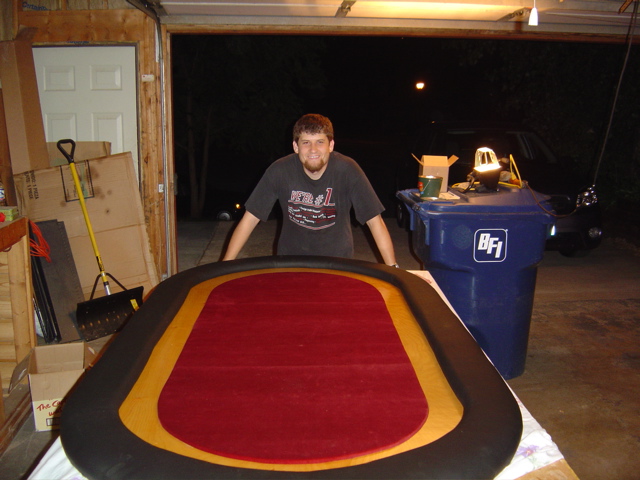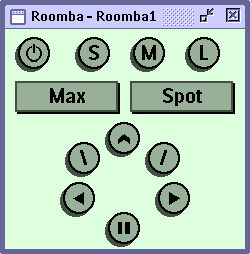A Clockwork Orange Costume
My Halloween costume this year came out pretty well. I went as Alex from Kubrick's A Clockwork Orange during his brainwashing. I made the head piece from scrap metal, some syringes, galvanized steel wire, rubber tubing, and a lot of rivets. The actual actor was temporarily blinded during the filming of that scene, but I went less hard-core on the eye restraints and the only after effects I've got are some bruising and puffiness. All in all better than I was hoping for. See the attached image for a photo. Thanks to the Kromhout clan for the photo.

Dead Pool
I've decided to run a dead pool this year. You can sign up at http://sarinity.com/deadpool/ by guessing 10 famous persons who you think might die during the next calendar year. The younger they are the more points you get, and the highest point total wins. Remember, it's not any more morbid than fantasy football is athletic.
Twin Cities Marathon
I'm again going against the 'only things that I create' policy for this mailing list, but unless you count lactic acid nothing was creating during my running of the twin cities marathon yesterday, yet I'm posting about it just the same. I beat my target time by a good 15 minutes though was still certainly in the tail-end of the pack zone. I hope to never run so much again so long as I live.
Mail To Wiki Gateway
I wanted a way to quickly append text to Moin Moin wikis. I wrote a Perl script to do just that. It relies on the email address suffix features available in most modern MTAs to get the page name.
Once the procmail recipe included in the accompanying procmail.rc file is in place for the user 'wiki' email sent to wiki-TextHere@somewhere.com will be appended to the TextHere wiki page.
I cheaped out on the formatting and just put the text inside literal/pre blocksblocks. The subject line and from header are retained and displayed.
By default the posts are done under no user, but the included makecookie.pl can be used to create a cookie file that the script will use to persist a wiki login (I tend to use EmailGateway).
It looks like there's been some updating and porting discussion of this script at ScriptMarket/EmailToWikiGateway
Diplomacy Tutorial
My all time favorite board game is called Diplomacy. It's got the tactical simplicity of chess mixed with the social aspects of poker. It's been popular in quite a few white houses -- reportedly the Kennedys played ferociously.
Unfortunately, it can be a difficult game to learn. Not because the rules are complex -- they're not, but only because there aren't a lot of good presentations of the rules. Oral descriptions quickly devolve into edge cases and exceptions, the printed rules look like they were written by lawyers, and just looking at the game board gives one the totally wrong impression that Diplomacy is like Risk or the hateful Axis and Allies.
A few years back I decided that a simple introduction to the rules was lacking, so I set out to create one. It's available at https://ry4an.org/diptutor/ and has been pretty darn popular over the last few years. Check it out, and if Diplomacy seems like your kind of game check out http://diplom.org and http://ry4an.org/mn-dip if you're local.
I Buy Liquor For Minors
It's not much of a creation, but I recently made a T-shirt that says, "I BUY LIQUOR FOR MINORS" in nice white on black lettering. I've worn it out a few times including to the Minnesota State Fair, mostly just to gauge responses to the sentiment. It seems the average parent furrows their brow, the average teenager looks intrigued, and the average bartender will still sell me two beers. I didn't actually have a single youth ask me to buy liquor for them, and all the people who actually told me they liked the shirt were in their 20s or 30s. Completely not the responses I expected.
Comments
People in their 20s and 30s aren't as likely to have rebelious, teenage kids. Any plans for an "I Slip Babies the Whiskey Teet" derivative? That might make people in their 20s and 30s a more interesting control group. -- Gabe Turner
Poker Table
As mentioned previously I'm a tool of the media machine and am thus now playing poker. I don't like online play so I host local events here at the house. We're getting more and more people and I wanted something nicer on which to play than folding card tables. Louis Duhon, a friend, and I drew up some plans, bought a lot of materials, moved the cars out of his garage, and spent four days working on a "one day project".
The result was some very nice tables with high end vinyl, velveteen, and birch. For the $250 we spent on materials we could have bought some low end tables but nothing approaching what we ended up with quality wise. Below is a photo and the plans in AutoCAD's DXF format and as a .png. Louis has a lot more photos at http://www.theshadowzone.org/media/poker-tables/poker-tables.html .


Silly Defensive Prompt Coloring
I don't like color in my command line windows. Colorization in ls's directory listings drives me bonkers; it's the first thing I turn off on a new system. I have, however, relented and added a little bit of conditional color to save me from an all too frequent error.
I have access to a lot of UNIX and UNIX-like systems. Some are machines I run, some are my employer's, and some belong to customers. Most all of them I've never physically seen but instead access through remote ssh, secure shell, connections. My normal command line prompt on these machines looks like:
[user@host ~]$
That says I'm on machine 'host' and logged in as 'user'. You'd think that would be enough to alert me when 'host' isn't my normal desktop machine or when I'm logged in as someone other than 'ry4an', but you'd be wrong. After issuing disastrous rm * commands when I didn't notice I was root and after one too many 'shutdown -h' when I didn't realize I was issuing commands to a server in a remote data-center instead of the computer in my closet, I finally wised up and did something about it.
Now when I'm logged into a remote machine the at-sign in my prompt is black-on-white instead of its normal white-on-back. The 'host' portion of each of my prompts is color coded to reflect which machine I'm logged in to, and when the 'user' portion says 'root' it's got a bright red background to let me know that commands are at their most dangerous.
None of this was hard to do, it was all just stuff I finally decided to do. I've attached the shell snippet I put in my /etc/bashrc to do the colorization of the three different parts. The local/remote detection probably only work with the gnu tool chain, but one never knows.
Roomba on the Pronto Remote
A few weeks back I got a Roomba Robotic Vacuum (http://www.irobot.com/consumer/product_detail.cfm?prodid=9) as a wonderful gift. Shipped with it was the optional remote control. The Roomba is fully automatic, but it's programmed to pick up dirt not to chase the cat -- you need the remote for that.
However, long time readers (you poor bastards) will remember that I try to maintain a strictly one remote coffee table (https://ry4an.org/unblog/msg00022.html). That meant the Roomba had to go onto the Phillips Pronto TSU-2000 Universal Remote. I thought for sure I'd find a CCF file for it, but it looks like only the people with newer remotes are getting the Roomba. Fortunately someone in the RemoteCentral forms helped out with instructions on how to back-convert the remote configuration and after a few wasted hours I can now steer the vacuum from the couch. Apparently I became a yuppie when I wasn't looking.
Anyway, attached are the CCF file and a screen-shot.

The Oldenburg
I've been rolling this one around in my head for a few years now, and I think it's finally coming closer to fruition: I'd like to start an old style social club.
In his book The Great Good Place Ray Oldenburg, Professor Emeritus at the Department of Sociology at the University of West Florida, says:
"Most needed are those 'third places' which lend a public balance to the increased privatization of home life. Third places are nothing more than informal public gathering places. The phrase 'third places' derives from considering our homes to be the 'first' places in our lives, and our work places the 'second.'"
Working from home I distinctly feel the need for at least a second place. Each day I head to the local coffee shop and drink more coffee than I should around semi-familiar faces. It's a pleasant time, but it's not community. Similarly in the evenings I frequently find myself wanting to get out of the house and amongst friends, without incurring the organizational and monetary expenses of an organized restaurant or bar outing.
I've got the notion that a semi-traditional social club might be just the thing for which I'm looking.
Before the 20th century gentlemen would belong to one or more social clubs where they would take meals, meet colleagues, enjoy a familiar and relaxed setting, and just generally escape the home. These clubs were typically men-only, though women-only clubs existed as well, and both generally discriminated against Jews and racial minorities.
In the 21st century these clubs still exist, albeit in a changed form. Membership policies are no longer (openly) discriminatory. The twin cities has two of the clubs of note: The Minneapolis Club (http://www.mplsclub.org/) and the University Club (http://www.universityclubofstpaul.com/). Both are large, opulent, and not quite what I'm looking for (not that they'd have me anyway).
Rather than a luxurious complex, I'd like to set the club up in just a room or two. Add some comfortable chairs, a liquor cabinet, a fridge, a bookshelf, a newspaper subscription, and twenty or so members and I think one could have the makings for a very pleasant place to while away evenings. A friend pointed out that this is almost exactly the sort of thing that the ACM, a student club, used to provide for us back in college but no longer can.
Funding would have to come in the form of monthly dues with a possible up-front initiation fee. Membership, governance, and policy could largely be cribbed from the charters of 19th century clubs with few modifications. Emily post even has a chapter on the subject: http://www.bartleby.com/95/30.html . Still there's a great deal of stuff that would have to be worked out amongst the charter members.
At this point I'm looking into general feasibility, possible locations, and interest level. I've set up a mailing list for anyone remotely interested to track progress and help shape the idea. It can be joined at: defunct. I've also got a survey which is open to anyone for whom the notion of a non-commercial third place resonates. It can be taken anonymously and can be found at: https://ry4an.org/oldenburg/survey/ .
None of this is exactly in line which what Ray Oldenburg is talking about. He's advocating free, public leisure spaces within walking distance whereas we're looking at a non-free, private leisure space to which some members will need to drive. Regardless, friend, neighbor, and interested party, Jamie, suggested we steal Ray Oldenburg's name for that of the club, and so far it's the best anyone's come up with, though nothing's final until the charter is signed.
If any part of this idea caught your interest please consider taking the survey. Even if you choose not to participate, your actions will help us to determine how The Oldenburg should be organized.
Tags
- funny
- java
- people
- python
- mongodb
- scala
- perl
- meta
- mercurial
- home
- security
- ideas-built
- ideas-unbuilt
- software
Contact
Content License

This work is licensed under a
Creative Commons Attribution-NonCommercial 3.0 Generic License.